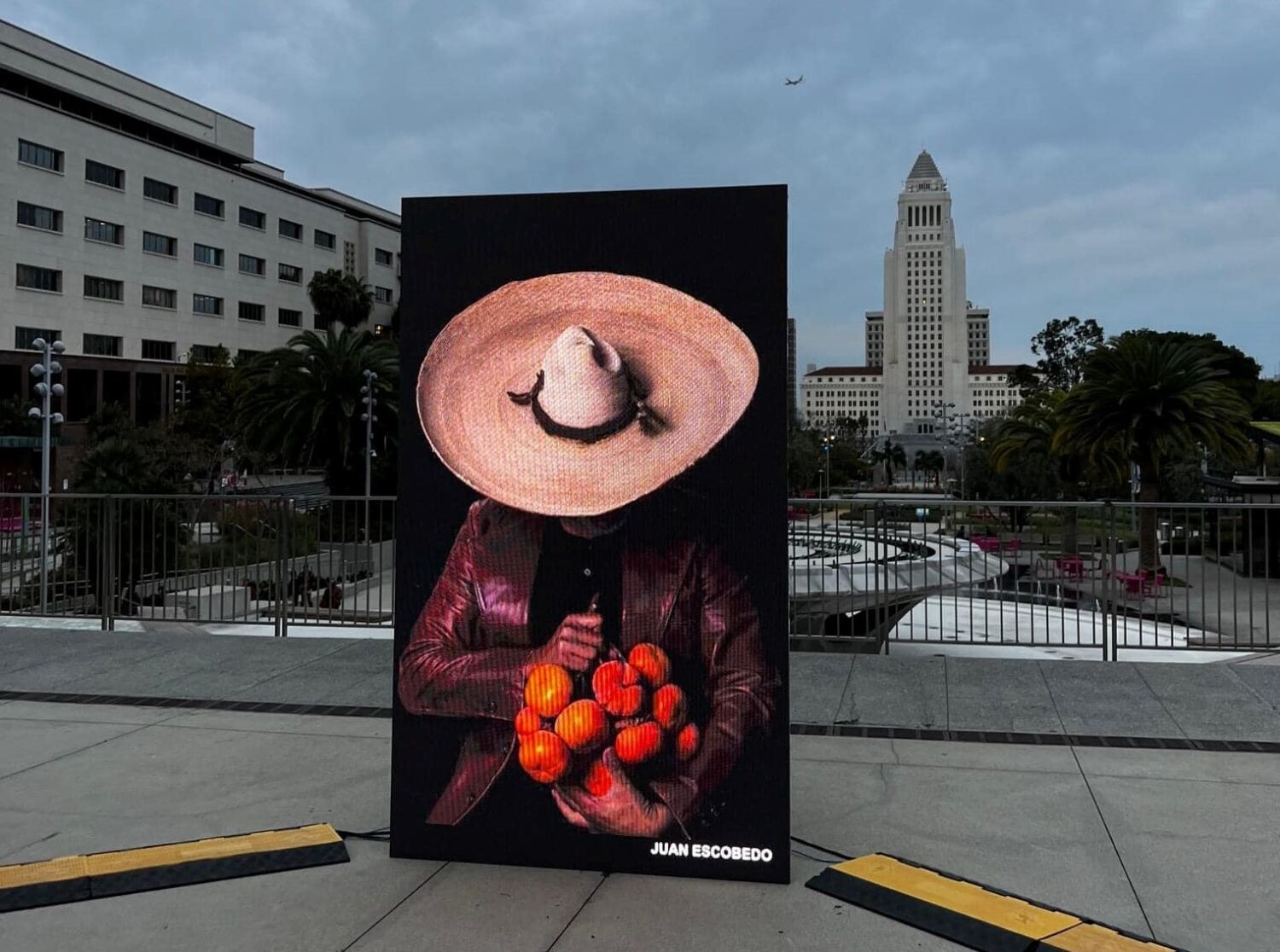Global Courant 2023-05-09 17:30:12
Juan Escobedo is one of those characters you need to know to understand the rhythm of this city. Sociable and cultured, donning his signature hat, he stands with one foot in Los Angeles and the other on the south side of the border. His heart is divided between those two loves.
Born in San Diego, he has strong roots in the state of Jalisco, which is where his penchant for hats comes from. His passion for hats helped him become famous here, after the Los Angeles County Department of Arts and Culture selected his “El Sombrero de Miguel Lopez” for a group show showcased March 11-18 at Gloria Molina Grand Park in downtown LA.
The photo was taken in 2018 and is a self-portrait of Escobedo wearing the sombrero of his grandfather, Miguel López.
“He was from Jalisco and came to the United States when visitors paid 50 cents to cross the border,” says Escobedo. “He didn’t find out he was part of the Bracero program until years later.”
“My grandfather always wore a hat when he rode horses or worked on the farm. The hat was an extension of who he was and of the country he cared about. I am honored to have been selected from so many great artists to feature my work in this exhibition. It’s like bringing it to life in the streets of this city.”
Escobedo knows very well that his home is here in California, but he also listens to the voices of his ancestors who constantly beckon him to experience the traditions, flavors and daily life of Mexico’s cities.
That’s why he feels just as much at home in a market in Boyle Heights, talking to young people who want to be filmmakers, or outside a church in Oaxaca, or in a town in Jalisco, enjoying the people, feeling protected, but at the same time a foreigner.
“How many of us have not felt that thrill upon returning to our country of origin?” Escobedo asks with a smile.
The artist Pinchi Michi in Zaachila, Oaxaca, in 2022.
(Juan Escobedo)
Edson Caballero Trujillo in Xaaga, Oaxaca, 2022.
(Juan Escobedo)
Escobedo’s penchant for shadows and angles comes from far away, most notably from Huejuquilla, Jalisco, where he was raised by his grandparents.
“Between dogs, cats, chickens and pigs, the house was kept in permanent semi-darkness,” he recalls. “The candles lit the images of the Virgin that my grandmother had, and the hats were part of the furniture in the house… In Huejuquilla, in Los Altos de Jalisco, there was no electricity, only oil lamps, and I remember that there were always hats, maidens and the striking image of San Martín de Porres, the saint of the beasts.”
In that chiaroscuro environment, reminiscent of the landscapes and photographs by the Mexican writer Juan RulfoEscobedo developed his sensitivity to images and the need to find his roots.
Edson Caballero Trujillo, one of the Aztec dancers who regularly perform at the Zócalo in Mexico.
(Juan Escobedo)
From those childhood memories comes his need to experiment with shadows, lighting and silhouettes. And the best way to express that need was through photography, which he started practicing when he was 15 years old when he was a student at La Jolla High School.
Through practice, he came to understand that the camera was not only a tool, but also a vehicle to raise awareness of various social issues. This is how ‘Trash and Tears’ was born, the series of photographs Escobedo started in 2017, in which he depicted actors and models amid marginalized urban landscapes.
In this series, Escobedo explores the problems of object accumulation, mental health, poverty, graffiti and drug addiction through images of the litter-strewn areas where homeless people often have to make their homes. “Trash and Tears” is a reflection on the ambiguous and precarious value of objects.
“What is trash to some is treasure to others,” says Escobedo.
Kisha Smith in the series ‘Trash and Tears’, 2018.
(Juan Escobedo)
Alvaro Daniel Marquez in the series “Trash and Tears” 2018.
(Juan Escobedo)
Although he feels like he belongs to Los Angeles, arriving in 1991 to study theater with an emphasis in directing and photography at Cal State LA and East LA College, Escobedo has devoted much of his photographic career to the recover his Mexican identity. , both in Jalisco and Oaxaca, where he has taken pictures that have brought him great personal satisfaction.
Juan Escobedo at Centro Histórico in Mexico City.
(Darcy Strother)
Although his search for photography dates back to his student days, he found his other calling by chance.
In 2007, a friend asked him to recite a poem entitled “I am a soldier in Iraq” in which he talks about how veterans are treated when they return to the United States, where too many of them are too often forgotten and even despised by the rest of society.
After reading the poem, he illustrated it with images and sent the video to the Cannes Film Festival, where it won the prize for best short film under four minutes from the Swiss Ministry of Arts and Culture. It also earned the Sonoma Film Festival’s Cinema of Conscience Award in 2008.
“When I got back to Los Angeles, I thought we should have a festival like this in East Los Angeles,” says Escobedo.
So he went to work. With the support of former LA County Supervisor Gloria Molina and Guadalupe Bojórquez of Casa Cultural, he organized the East LA Film Festivalwhich has been taking place since 2008, and which brings together the works of numerous local artists trying to stand out in this competitive industry.
Hand in hand with the festival was born the East LA Society of Film and Arts, better known as TELASOFA, a non-profit organization that aims to provide young people from marginalized areas of Los Angeles with the opportunity to experience the art of filmmaking. to learn. .
Escobedo has built a reputation as a filmmaker. He was nominated for the prestigious Premio Imagen (2009), which recognizes positive portrayals of Latinos in film and television. His other works as a director include ‘Ruby’ a movie for Current TV.
2018, “Marisol,” a short film about the horrors of domestic violence and child abuse, won Best Dramatic Short Film at the Hollywood Reel Independent Film Festival and Best Actress for both lead actresses, Siennah Ortiz and Toni Torres, at the Women’s Independent Film Festival and at the Playhouse West Film Festival. In May 2022, this short won Best Director, Best Child Actress, and Best Short Film at the San Diego Movie Awards in Balboa Park.
The script for “Marisol” also became part of the permanent collection of the Margaret Herrick Library of the Academy of Motion Picture Arts and Sciences, where it is available to researchers.
But Escobedo still has a long way to go. One of his future projects is a film that addresses the issue of Mexico’s black population. “It’s a part of society that has been forgotten, marginalized and tried to erase for centuries,” says Escobedo, who will soon travel to the states of Oaxaca and Guerrero to rediscover that part of Mexican history.
“If we forget who we are, we are lost,” he says.
Juan Escobedo in the city of Oaxaca, 2019.
(Juan Ponce)








